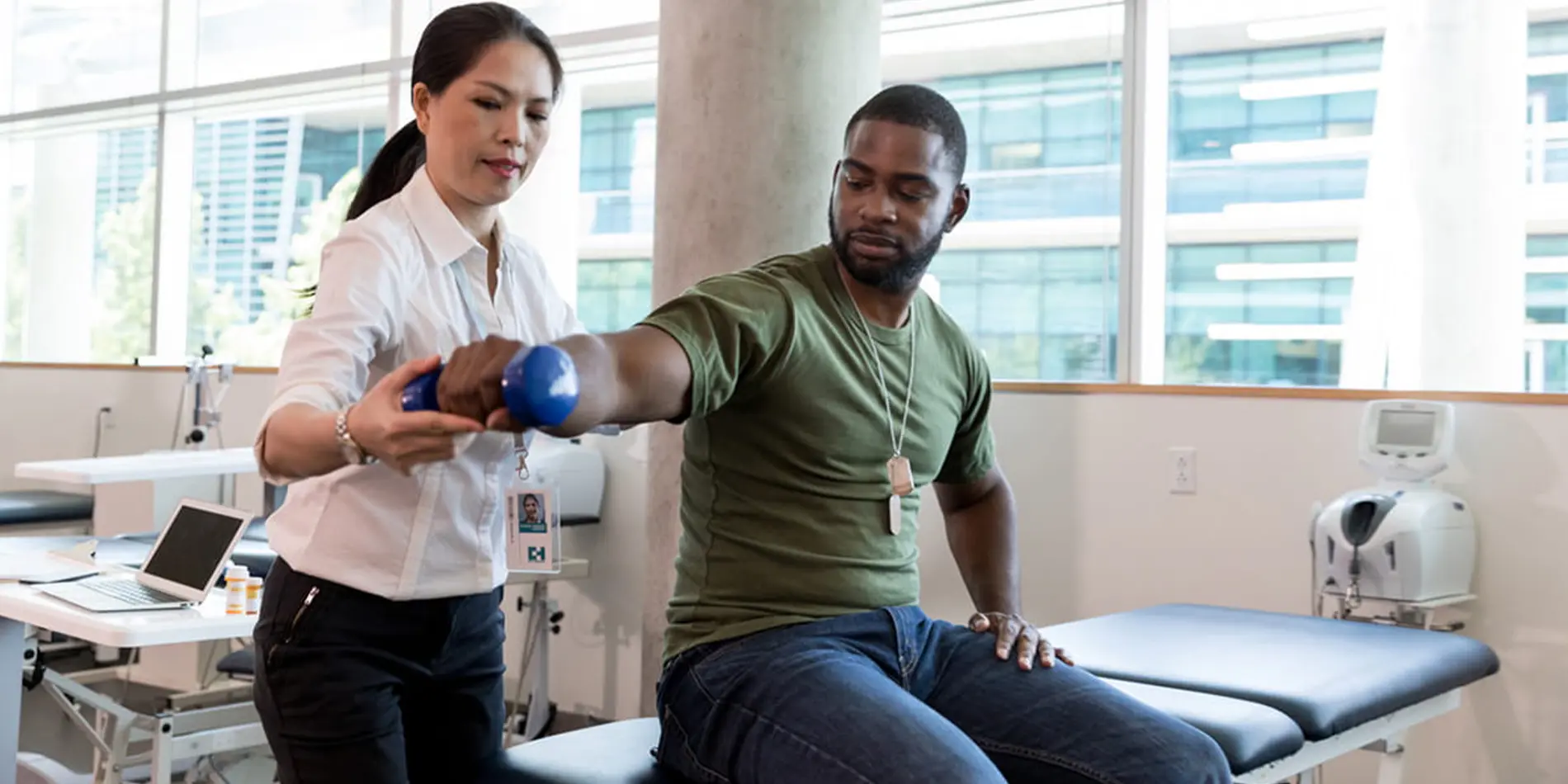Physical therapists (PTs) are healthcare professionals who help patients heal from orthopedic, neurological, and cardiovascular disabilities or injuries through prescribed movement. Their goal is to use their education and clinical experience to enhance people’s quality of life. Becoming a physical therapist is a great option for those interested in making a difference in people’s lives while working in a growing field.
If you’re interested in becoming a physical therapist, you’re required to obtain a Doctor of Physical Therapy (DPT) degree, a clinical doctorate demonstrating expertise in human movement.
“Universally, the entry-level degree for physical therapists across the country is a DPT, but not all DPTs are created equal,” said Dr. Christopher Cesario, associate clinical professor and Director of Student Affairs for the Doctor of Physical Therapy (DPT) program at Northeastern University’s Bouvé College of Health Sciences.
Is a DPT degree worth it? Physical therapists need this education to properly treat pain, injuries, and movement impairments that affect a patient’s quality of life. For example, these programs focus on patient education, movement exercises, and hands-on therapeutic care to ensure PTs are prepared to help individuals of all ages regain mobility and range of motion, reduce discomfort, and heal from injuries.
Four Benefits of Earning a DPT
1. Grants Physical Therapy Credentials
According to the American Physical Therapy Association (APTA), all physical therapists in the U.S. must earn a DPT from an accredited program and pass a state licensure exam before they can begin practicing.
In a traditional program, students complete their undergraduate and postgraduate degrees separately. So, after earning a bachelor’s degree in a related field, you can obtain a doctorate in three years. Most institutions follow this model because it gives students more time and flexibility to figure out what they want to do and gain experience that will enrich their postgraduate education.
“There is no other way to become a physical therapist without it,” said Cesario.
2. Allows for More Career Flexibility
While physical therapy is a growing field that has gained new ground in the last decade, there remains a common misconception that there’s only one career path available to prospective therapists. However, data continues to show that this healthcare profession is in high demand—even outside of hospitals and private practices and according to Cesario, there’s a lot of flexibility in physical therapy.
It doesn’t matter how much time has passed after earning a DPT and what career path you initially chose, “you can change careers, workplace settings, and hours. You can even decide to start your own business. I think that flexibility is a unique feature in this career and educational path,” he said. “You don’t feel like you’re boxed into what you’re going to do for the rest of your life.”
There are numerous career opportunities for physical therapists, though most PT professionals start their career in a standard outpatient orthopedic setting. While some physical therapists will spend the majority of their career in an outpatient environment, others choose different settings in which to practice. A few options include:
- Home Health Physical Therapists
- Travel Physical Therapists
- Outpatient Physical Therapists
- Skilled Nursing Facility Physical Therapist
- Acute Physical Therapists
- Inpatient Physical Therapists
3. Increases Professional Portability
If you’re looking for a profession that allows for change and multiple possible career paths, physical therapy is a great choice.
According to Cesario, there’s a lot of portability in this profession. “PTs can move—whether it be local or across the country—there’s always going to be a need for physical therapy.”
Since this profession is in high demand, there are plenty of physical therapy job openings across the country. Some states, like California, are in desperate need of great physical therapists across a variety of settings.
4. Provides Opportunities to Make a Difference
There’s no doubt that physical therapy is a field that allows you to make a difference. Physical therapists help people regain strength and reach their rehabilitation goals, providing much-needed support at what is often a difficult time in patients’ lives. Physical therapy is a broad field that overlaps with nearly every type of healthcare practice. Whether you enjoy helping people recuperate or teaching them how to manage pain, therapeutic careers offer countless ways to make a difference in the lives of others.
“I think the intangible elements of this profession are just as important to highlight,” said Cesario. “You hear these stories all the time. For example, physical therapists can treat somebody who couldn’t walk and now they can, or take care of someone who had surgery and couldn’t play sports anymore and now they’re recovered and thriving. That kind of job satisfaction is the piece that I think is hard to quantify, but in many ways, it’s the most important one.”
Choosing the Right DPT Program
Choosing the right degree program plays a huge role in how well you’re positioned to enter the field. The availability of developmental resources, level of faculty engagement, and opportunities for networking can make or break your educational experience.
Northeastern University’s Bouvé College of Health Sciences Post Baccalaureate Doctor of Physical Therapy (DPT) degree offers amazing opportunities for PT students. From the expert faculty to the experiential learning resources, students gain all the tools, support, and skills they need to start their physical therapy careers from a strong position.
If you’re interested in learning about enrollment options, contact a Northeastern University admissions counselor for more information about the DPT program.
Download Our Free Guide

Career Guide
Everything You Need To Know About Becoming a Physical Therapist




